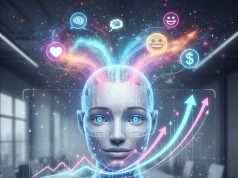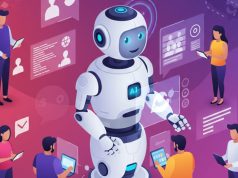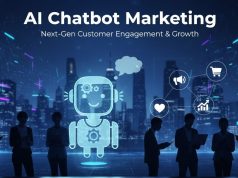Social media and healthcare may not seem like a match made in heaven, but artificial intelligence (AI) enabled chatbots are changing that story. These user-friendly tools are blazing the trail for mobile health innovation in the form of immediate, efficient, and personalized healthcare.
What Are Social Media Chatbots in Healthcare?

Social media chatbots are AI-driven bots that interact with users providing bubbly, conversational-based interfaces through apps like Facebook Messenger, WhatsApp andor Instagram. Unlike common chatbots, health chatbots exploit state-of-the-art technologies such as natural language processing (NLP) and machine learning to understand and reply to user questions appropriately.
These chatbots frequently cooperate with mobile medical apps, allowing the receipt of information, advice and support on time within a multi-device environment the user is working on. This collaborative effort has led to numerous breakthroughs in the way healthcare is digitally delivered.
The Role of Chatbots in Mobile Medical Apps

1. Providing On-Demand Health Information
Gone are the days of waiting indefinitely for an appointment to address minor health concerns. Social media chatbots can handle routine questions with ease, offering real-time responses backed by vetted medical databases. For instance, a user experiencing flu symptoms could ask a chatbot on Messenger about common remedies or when to seek medical attention.
Example App Integration:
- Ada Health combines its mobile app with chatbot functionality to provide symptom assessments, ensuring users receive information tailored to their conditions.
2. Driving Patient Engagement
Engagement is at the heart of healthcare innovation, and chatbots excel in this area by fostering continuous interaction. They remind users to take their medication, schedule doctor appointments, or complete follow-ups, keeping them actively involved in their care plans without feeling overwhelmed.
Example Feature:
- Pill Reminder Chatbots in apps like Medisafe, which integrate directly into messaging platforms to provide non-intrusive but essential notifications.
3. Enhancing Mental Health Support
Mental health services are among the most significant beneficiaries of social media chatbots. These tools offer anonymity, accessibility, and affordability, breaking barriers that traditionally prevent people from seeking therapy.
For instance, Woebot, a mental health chatbot, engages users in cognitive behavioral therapy (CBT) techniques directly from their devices, making professional psychological support just a chat away.
Key Benefits of Chatbots in Mobile Medical Apps

1. Accessibility Anytime, Anywhere
Chatbots are available 24/7, making medical guidance accessible when users need it. Whether someone has a health query at 2 a.m. or wants to schedule their next appointment during a busy workday, chatbots are always ready to help.
2. Cost-Effective Solutions
Hiring human service providers to manage queries and appointments is costly, making chatbots a viable alternative. By automating routine tasks, healthcare providers can reduce overhead costs while still maintaining high levels of patient satisfaction.
3. Personalization at Scale
AI-driven chatbots continuously learn and adapt to users’ needs. Using patient data (with appropriate consent), they can deliver personalized recommendations, insights, and reminders tailored to each individual.
4. Scalable for Healthcare Providers
A single chatbot has the capability to engage thousands of people simultaneously, making it an exceptional tool for healthcare providers aiming to scale their services. For example, a hospital facing hundreds of COVID-19-related inquiries daily could deploy a chatbot to streamline information delivery without overwhelming its staff.
Improving Appointment Scheduling and Follow-Ups
Social media chatbots simplify appointment scheduling by allowing patients to book, reschedule, or cancel visits directly through messaging platforms. Instead of navigating complex booking systems or waiting on calls, users can interact naturally with chatbots to manage appointments in seconds. These bots can also send automated reminders, reducing missed appointments and improving clinic efficiency. Follow-up messages after visits help patients remember care instructions, medications, or next steps. By streamlining scheduling and follow-ups, chatbots reduce administrative burden for healthcare providers while improving patient satisfaction and continuity of care.
Supporting Chronic Disease Management
Chatbots play an important role in helping patients manage chronic conditions such as diabetes, hypertension, or asthma. They can send daily reminders for medication, track symptoms, and encourage healthy habits through consistent engagement. Patients can log readings like blood sugar or blood pressure, and chatbots can provide feedback or alerts when values fall outside safe ranges. This ongoing support helps patients stay compliant with treatment plans and feel more in control of their health. Over time, chatbot-driven monitoring can lead to better outcomes and reduced hospital visits.
Enhancing Preventive Care and Health Awareness
Preventive care is essential for reducing long-term healthcare costs and improving population health, and chatbots make it more accessible. Social media chatbots can educate users about vaccinations, routine screenings, and healthy lifestyle choices through short, engaging conversations. They can send timely reminders for check-ups and share personalized tips based on age, gender, or health history. By delivering preventive care information in a familiar social media environment, chatbots encourage proactive health behavior and help users take action before conditions become serious.
Reducing Healthcare Provider Workload
Healthcare professionals often face overwhelming workloads due to repetitive patient queries and administrative tasks. Chatbots help reduce this burden by handling common questions, appointment requests, and basic guidance automatically. This allows doctors, nurses, and staff to focus on complex cases and direct patient care. By filtering non-urgent inquiries, chatbots improve response times and operational efficiency. For healthcare organizations, this translates into cost savings, reduced burnout among staff, and improved quality of service without compromising patient communication.
Improving Multilingual Healthcare Access
Language barriers can prevent patients from receiving accurate medical information and care. AI-powered chatbots help bridge this gap by offering multilingual support across social media platforms. Users can communicate in their preferred language, making healthcare information more inclusive and accessible. This is especially valuable in diverse communities and global health initiatives. By ensuring that language is not a limitation, chatbots improve patient understanding, reduce miscommunication, and promote equitable access to healthcare services across different populations.
Integrating Wearables and Health Data

Chatbots can integrate with wearable devices and health-tracking apps to deliver more personalized and data-driven healthcare experiences. By analyzing real-time data such as heart rate, activity levels, or sleep patterns, chatbots can provide meaningful insights and recommendations. Users can receive alerts when abnormal patterns are detected or encouragement when health goals are met. This integration enhances preventive care and continuous monitoring, empowering users to make informed decisions while giving healthcare providers better visibility into patient health trends.
Building Trust Through Transparent Communication
Trust is a critical factor in digital healthcare adoption, and chatbots can help build it through clear and transparent communication. By explaining medical processes, privacy policies, and treatment steps in simple language, chatbots reduce uncertainty and anxiety for users. Consistent, accurate responses help establish credibility and reliability over time. When patients feel informed and respected, they are more likely to engage with digital health tools and follow medical advice, strengthening long-term relationships between users and healthcare providers.
Expanding Healthcare Access in Remote Areas
In remote or underserved regions, access to healthcare professionals is often limited. Social media chatbots help bridge this gap by providing basic medical guidance and health education through widely available platforms. Users can receive information, symptom guidance, and referrals without traveling long distances. While chatbots do not replace doctors, they serve as a valuable first point of contact. This expanded access supports early intervention, improves health literacy, and reduces disparities in healthcare delivery across different geographic locations.
Challenges Facing Chatbot Integration in Healthcare
While chatbots are driving remarkable innovation, their deployment is not without hurdles.
1. Data Privacy Concerns
Healthcare data is sensitive, and users must feel confident that their information is secure. Breaking down privacy barriers is a crucial step in fostering trust in chatbot technologies.
2. Limited Scope of Understanding
Despite advanced NLP capabilities, chatbots still struggle with highly nuanced or medically complex conversations. Developers must continue to enhance these tools to match the expertise of trained professionals.
3. Digital Divide
Although chatbots are designed for accessibility, users without access to stable internet or those uncomfortable with technology may find it challenging to adopt these platforms.
What’s Next for Social Media Chatbots in Healthcare?
The future holds immense potential for this technology. With machine learning algorithms becoming increasingly sophisticated, chatbots could soon handle more advanced medical diagnoses or even aid in emergency triage scenarios. Additionally, as they become HIPAA-compliant, chatbots will gain more credibility in patient data handling.
Healthcare providers should keep an eye on advancements in AI and integrate chatbot technologies where appropriate. Pairing these tools with user-friendly mobile apps will be key to ensuring maximum adoption and effectiveness.
Final Thoughts: Unlocking the Full Potential of Chatbots
Chatbots on social networks have become effective tools that can redefine the healthcare world. But if they can be used to provide services that are more available, tailored and effective, they also have the potential to change lives around the world.
If you are in the business of developing mobile medical apps, then you should think about adding chatbots to your user experience. It will not only drive patient engagement, but it will position your app at the forefront of healthcare innovation.
Want to discover how AI can enable your healthcare solutions? Contact us about custom chatbot development and how it can revolutionize your offerings.
Read more about this content: Emotion AI Chatbot Marketing: Building Empathetic Customer Connections for.
Frequently Asked Questions (FAQ)
1. What are social media chatbots in healthcare?
Social media chatbots in healthcare are AI-powered tools that interact with users through platforms like WhatsApp, Facebook Messenger, or Instagram. They are designed to answer health-related questions, provide guidance, send reminders, and support patient engagement by using technologies such as natural language processing and machine learning.
2. How do chatbots improve mobile medical apps?
Chatbots enhance mobile medical apps by providing instant responses, improving user engagement, and offering personalized health support. They help users access information quickly, manage appointments, receive medication reminders, and stay connected to healthcare services without needing constant human intervention.
3. Are healthcare chatbots safe to use?
Healthcare chatbots can be safe when they follow strict data protection standards and comply with healthcare regulations. Reputable chatbots use encryption, secure data storage, and user consent to protect sensitive medical information, although users should always verify an app’s privacy policies before use.
4. Can chatbots replace doctors or medical professionals?
Chatbots are not meant to replace doctors or healthcare professionals. Instead, they support medical services by handling routine tasks, answering basic questions, and guiding users toward professional care when necessary. Complex diagnoses and treatments still require human medical expertise.
5. How do chatbots support mental health care?
Chatbots support mental health care by providing accessible, anonymous, and affordable assistance. They can guide users through evidence-based techniques such as cognitive behavioral therapy, offer emotional support, and encourage healthier coping habits, making mental health resources more approachable.
6. What are the main benefits of using chatbots in healthcare?
The main benefits include 24/7 availability, cost efficiency, improved patient engagement, scalability, and personalized communication. These advantages help healthcare providers deliver better services while reducing operational strain and improving patient satisfaction.
7. What challenges do healthcare chatbots face?
Healthcare chatbots face challenges such as data privacy concerns, limited understanding of complex medical conditions, and accessibility issues for users with limited technology access. Overcoming these challenges requires continuous technological improvement and strong regulatory compliance.
8. Are healthcare chatbots compliant with medical regulations?
Many modern healthcare chatbots are designed to comply with regulations like HIPAA or GDPR, depending on the region. Compliance ensures responsible handling of patient data, but not all chatbots meet these standards, so providers must carefully evaluate solutions before implementation.
9. How will healthcare chatbots evolve in the future?
In the future, healthcare chatbots are expected to become more intelligent, accurate, and integrated with medical systems. Advancements in AI may allow them to assist with triage, monitor chronic conditions, and provide deeper insights while maintaining strict data security standards.
10. Should mobile healthcare apps integrate chatbots?
Yes, integrating chatbots can significantly enhance mobile healthcare apps by improving user experience, increasing engagement, and expanding access to care. Chatbots help apps stay competitive while meeting the growing demand for convenient, digital-first healthcare solutions.









